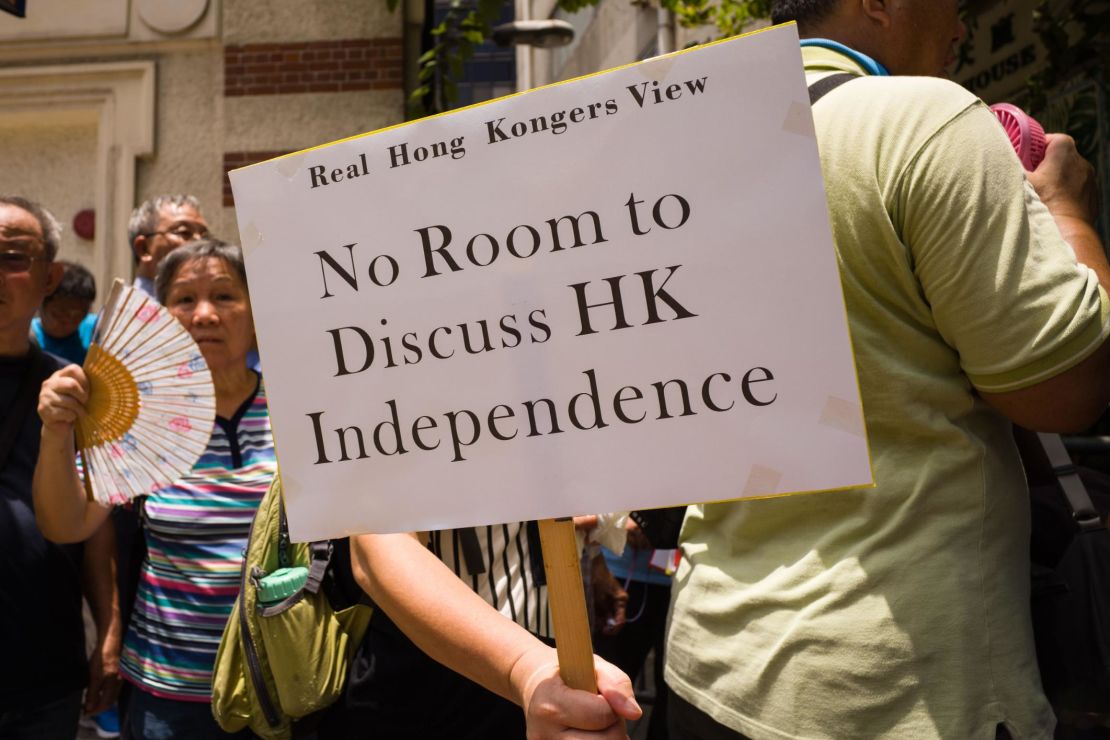The Hong Kong government has officially banned a pro-independence party on the grounds of national security, an unprecedented move that has sparked new concerns about restrictions on political freedoms in the semi-autonomous Chinese city.
It is now illegal to be a member of Hong Kong National Party, act on its behalf, or raise funds for it. Offenders could face up to three years in prison and fines of up to $12,000, according to a notice posted by authorities Monday citing legislation under the Societies Ordinance.
The decision follows a call by the Hong Kong police in July to outlaw the party under the colonial-era ordinance for posing an “imminent threat to national security.”
“The Hong Kong National Party has a very clear agenda to achieve its goal of Hong Kong being made an independent republic. Over the two years it has planned and executed actions to implement the plan,” Security Secretary John Lee said Monday, adding that the party has spread hatred against Chinese immigrants and advocated an “armed revolution” to achieve Hong Kong independence.
Andy Chan, convenor of the Hong Kong National Party, did not immediately respond to a request for comment. He has always maintained his organization is non-violent.
Last month, Chan gave a hugely scrutinized speech at the Foreign Correspondents Club, which eventually went ahead despite attempts by the government and other figures to pressure the club to drop it, and protests by pro-Beijing groups.
“We were once colonized by the Brits, and now we are colonized by the Chinese, where is our right to determine our own future?” said Chan, who also warned that Hong Kong could follow the path of Tibet and Xinjiang, where China has recently been accused of imprisoning hundreds of thousands of Uyghur Muslims.
The Societies Ordinance used to outlaw Chan’s party has previously been criticized for being overly restrictive. In 1992 the last colonial government of Hong Kong amended the directive to bring it in line with international human rights law, but this move was reversed once China assumed control of the territory, one of several liberalizing reforms thrown out by the provisional legislative council, an appointed body stacked with pro-Beijing figures.
Maya Wang, a Hong Kong-based researcher for Human Rights Watch, said the government’s justification for the ban as a pre-emptive step to protect national security, “sets a dangerous precedent, where more non-violent pro-democracy political groups may be similarly banned.”
“The ban violates a range of human rights guaranteed to Hong Kong people, including the rights to freedom of association and assembly,” she added.

Political pressure
Founded in 2016 to advocate for Hong Kong’s independence from China, the HKNP has already faced restrictions on operating. Chan was one of several separatist candidates barred from standing in 2016’s legislative elections, and the group has also struggled in the past to get police permission to hold rallies or protests.
Support for Hong Kong independence and greater autonomy from China has grown as Beijing has increasingly encroached on the city’s freedoms and promised political reform has not panned out.
However, Chinese leader Xi Jinping warned during a visit to the city last year that it was a “red line” for the central government.
The banning of HKNP comes the day after the opening of a controversial high-speed rail link with China, which critics say was another blow to Hong Kong’s autonomy. Under the agreement with Beijing, Chinese law governs a part of West Kowloon Station, which is located in central Hong Kong, and Chinese police will be able to make arrests, including potentially taking suspects to the mainland for trial.
That move is especially controversial in the wake of two alleged abductions by Chinese agents of bookseller Lee Bo, a British citizen, and Chinese billionaire Xiao Jianhua, from Hong Kong.
Hanging over the ban of HKNP on the grounds of national security is Article 23 of the Basic Law, Hong Kong’s de facto constitution. It calls on the local government to “enact laws on its own to prohibit any act of treason, secession, sedition, subversion against the Central People’s Government.”
Attempts to bring Article 23 into force in 2003 sparked mass street protests, and the matter has been on the back burner for multiple administrations ever since.
For Chan, this is a moot point. “Article 23 is already in effect right now,” he told CNN last month. “They can ban any political party due to threats to national security, they can disqualify legislators.”
“In the past 20 years, Hong Kong has only progressed in one direction: backwards,” he said.
CNN’s Eric Cheung contributed reporting.

